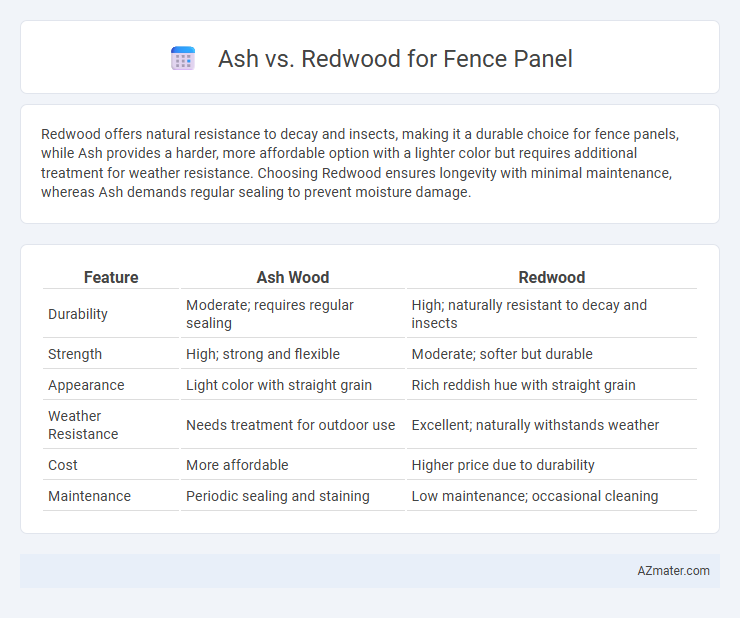Redwood offers natural resistance to decay and insects, making it a durable choice for fence panels, while Ash provides a harder, more affordable option with a lighter color but requires additional treatment for weather resistance. Choosing Redwood ensures longevity with minimal maintenance, whereas Ash demands regular sealing to prevent moisture damage.
Table of Comparison
| Feature | Ash Wood | Redwood |
|---|---|---|
| Durability | Moderate; requires regular sealing | High; naturally resistant to decay and insects |
| Strength | High; strong and flexible | Moderate; softer but durable |
| Appearance | Light color with straight grain | Rich reddish hue with straight grain |
| Weather Resistance | Needs treatment for outdoor use | Excellent; naturally withstands weather |
| Cost | More affordable | Higher price due to durability |
| Maintenance | Periodic sealing and staining | Low maintenance; occasional cleaning |
Introduction to Ash and Redwood for Fence Panels
Ash wood, known for its strength and durability, offers excellent resistance to wear and impact, making it a reliable choice for fence panels that require longevity. Redwood, prized for its natural resistance to decay and insect damage, provides a rich, reddish hue that enhances outdoor aesthetics while maintaining structural integrity. Both woods present unique benefits for fencing, with ash delivering robustness and redwood contributing superior weather resistance and natural beauty.
Wood Characteristics: Ash vs Redwood
Ash wood exhibits a light color with a smooth, straight grain pattern, offering excellent strength and shock resistance ideal for robust fence panels. Redwood presents a rich reddish hue with natural oils that enhance decay resistance and weather durability, making it a low-maintenance option for outdoor fencing. Both woods provide distinct aesthetic qualities, but Ash is favored for its hardness, while Redwood excels in longevity and natural pest resistance.
Durability and Lifespan Comparison
Ash offers excellent strength and shock resistance, making it a durable option for fence panels with a natural hardness that withstands impact well. Redwood contains natural tannins and oils that provide superior decay and insect resistance, contributing to a longer lifespan of up to 20-30 years when properly maintained. While Ash is strong, Redwood's inherent weather-resistant properties typically make it a more durable and longer-lasting choice for outdoor fencing applications.
Resistance to Decay and Insects
Ash wood demonstrates moderate resistance to decay and insects, making it a decent choice for fence panels in areas with mild weather conditions. Redwood, however, offers superior natural resistance to decay and insect infestations due to its high tannin content, enhancing fence panel durability in harsh environments. For long-lasting outdoor fencing, redwood generally outperforms ash in durability against environmental stressors.
Maintenance Needs for Ash and Redwood
Ash fence panels require regular sealing and occasional sanding to prevent moisture damage and maintain their appearance, as the wood is prone to warping and cracking in harsh weather conditions. Redwood panels naturally resist decay and insect infestation due to their high tannin content, resulting in lower maintenance demands, typically limited to annual cleaning and reapplication of protective oil or stain. Choosing redwood reduces long-term upkeep costs and effort compared to ash, which necessitates more frequent maintenance to preserve durability and aesthetics.
Aesthetic Appeal and Color Differences
Ash fence panels display a light, creamy color that ages to a soft gray, providing a warm and rustic aesthetic ideal for natural outdoor settings. Redwood offers rich, deep red and brown tones that enhance visual warmth with natural variation, maintaining vibrancy longer due to inherent tannins resistant to weathering. Choosing between Ash and Redwood depends on desired color longevity and ambiance, with Ash delivering subtle elegance and Redwood offering bold, enduring hues.
Cost Analysis: Ash Fence Panels vs Redwood
Ash fence panels typically cost less than redwood due to ash being more abundant and faster-growing, resulting in lower raw material expenses. Redwood panels command a higher price because of their natural resistance to decay, insect damage, and superior durability, which offsets initial investment with less maintenance over time. Comparing long-term cost-effectiveness, ash offers an economical upfront solution, while redwood delivers lower life-cycle costs in high-moisture or pest-prone environments.
Environmental Impact and Sustainability
Ash and redwood differ significantly in environmental impact and sustainability for fence panels. Ash is a fast-growing hardwood that is often sourced from sustainably managed forests, offering a renewable option with lower carbon footprints due to its shorter growth cycle. Redwood, prized for its natural resistance to decay and pests, frequently comes from old-growth forests, raising concerns about deforestation and habitat loss despite its durability and longevity in fencing applications.
Installation Tips for Each Wood Type
Ash fence panels require pre-drilling pilot holes to prevent splitting during installation due to their dense grain structure. Redwood panels are naturally resistant to decay and insects, allowing for easier handling without extensive chemical treatments, but installers should use corrosion-resistant fasteners to maintain longevity. Both wood types benefit from sealing edges and bottoms to minimize moisture absorption and extend the fence's lifespan.
Which is Better: Ash or Redwood Fence Panels?
Ash fence panels offer exceptional strength and durability, making them ideal for areas requiring high impact resistance, while redwood panels excel in natural rot resistance and aesthetic appeal due to their rich color and grain. Redwood's natural oils provide superior protection against moisture and insects, reducing maintenance compared to ash, which may require sealing for prolonged outdoor use. Choosing between ash and redwood fence panels depends on prioritizing either structural toughness or long-lasting beauty and low upkeep.

Infographic: Ash vs Redwood for Fence Panel
 azmater.com
azmater.com